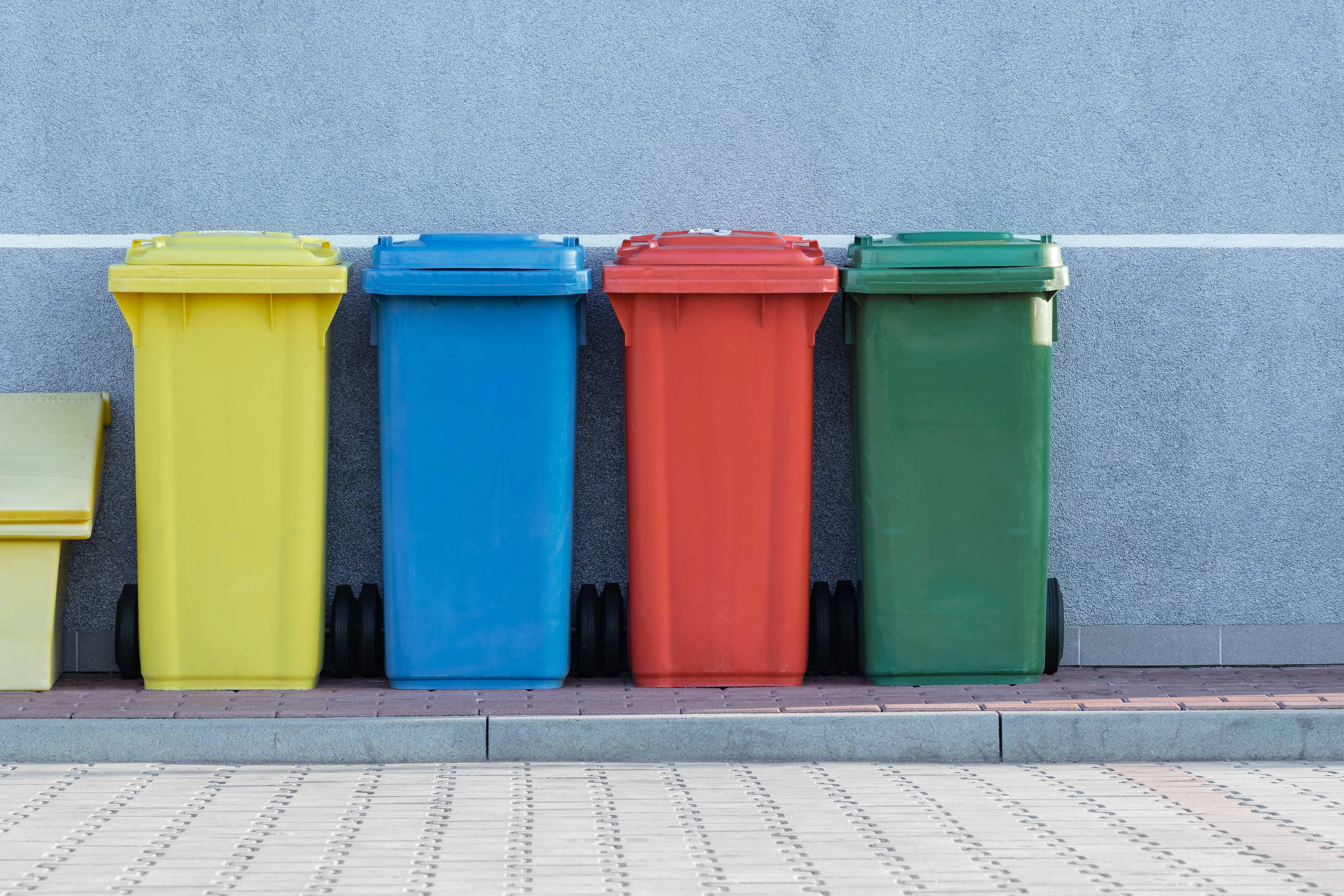What happens to household recycling?
Your local authority is legally responsible for collecting your household waste. Services on offer vary by region, but usually include your:
- Recycling bin for general household waste
- Wheelie bins for recycling
- Food-compost bin
- Garden-waste bin or compost bags
- Special collection services for bulky household goods (usually there’s a charge for this)

Where you live has a big impact on your recycling opportunities. You’re in luck if you live in St Albans City and District Council: it has a recycling rate of 64.2% and was presented with the trophy for being the highest performing council in England in March 2022.
However, if you live in Barrow-in-Furness (North West) or Newham (London), you’re not so lucky. They have the worst recycling rates in the country: only 18.7% and 20.3%, respectively.
You can find out more about the services your local council offers here and here.
What happens to business recycling?
If you run a business, you have a duty of care to ensure your waste is handled and disposed of properly. This can either be done by an authorised private waste contractor or by the local authority (although not all local authorities offer this service).
You can check whether a company is registered as a 'carrier of waste' by visiting the Environment Agency Online Register.
It's essential that you provide a written description of your waste to the company that removes it. This is called a 'Waste Transfer Note' and must be completed annually by both parties involved in the transfer. Your chosen waste contractor will provide this to you and you must keep it for at least two years.
What does First Mile do with your waste and recycling?
What does First Mile do with your waste and recycling? We take your waste and recycling to our award-winning Sacktory®, which processes on average 100 tonnes a day of segregated recycling (green sacks), dry mixed recycling and general waste. The rubbish is hand sorted into general waste and recycling. Because we have a zero-to-landfill policy, we ensure that nothing goes to landfill sites. We take any non-recyclable waste to an Energy from Waste facility, where it's incinerated. This process generates renewable energy that powers UK homes.

How are different materials recycled?
Food waste
Food waste is combined in a skip at our Sacktory®, before being transported to an Anaerobic Digestion facility. The food is then pumped into a digestion tank, which is a bit like a giant stomach. Microorganisms break down the food, a process which creates biogas.
The biogas is fed into a combined heat and power engine that provides energy to the National Grid. Anything left over is used as liquid fertiliser on farmland.
Different types of plastic waste involve different processes. Let's take a look at two:
PET/HDPE
This is the type used to make plastic bottles and containers. We prewash the items and send them through a laser sorting machine to separate clear plastic and green plastic. Then we wash them in hot, soapy water that heats them just enough to get rid of their caps and labels.
Next, the plastic goes through a granulation process. This takes larger pieces of plastic and shreds them down, or melts them into pellets and granules. These are then combined or reshaped to create brand-new products, such as polyester fabric and carpets, or new plastic bottles and food containers.
Flexible Plastics waste
This includes products like carrier bags, food pouches, soft plastic packaging and bubble wrap. These are sorted via a dedicated recycling service. We collect the flexible plastic and take it to our recycling centre, where it's packed into bales for onward transportation. The material is then cleaned and shredded before being recycled into black bin bags ready for reuse.
Glass waste
Glass is taken to a treatment plant, where it's sorted by colour and washed to remove any impurities. The glass is then crushed and melted. Once melted, it's moulded into new products such as glass bottles and jars, ready to be used again.
Glass can be used to make new glass bottles over and over again, as it can be recycled indefinitely without any loss in purity or quality. This makes it an excellent alternative to single-use plastics and a great tool to help fight the plastic problem.
Metal waste
Aluminium and steel are separated at our recycling facility before they go through a re-melting process that turns them into molten metal. Which removes any inks or coatings from each particular material.
The metal is then made into large ingots which can contain about 1.6 million steel cans and aluminium cans. These ingots are sent to mills, where they're rolled out and made back into new aluminium and steel products.
Cardboard waste
Cardboard recycling collected is taken to the Sacktory, it is then mixed with water, creating a pulp, residual waste and contaminants are removed at this stage using filters.
The remaining material is then mixed and pressed, before being fed into a paper-making machine which removes water from the paper paste, drying the material to make long paper sheets.
These paper sheets can then be reused to produce cardboard.
Coffee cups
Coffee cups look like paper, but they actually have a thin plastic liner inside to hold the coffee. This means that the paper and plastic need to be separated before recycling is possible. This makes it tricky, but not impossible. We shred coffee cups at our Sacktory®, then send the bits onto a processor to separate the paper from the plastic. The shreds are then given a second life as paper-based products, such as notebooks and shopping bags.
Coffee grounds
Coffee grounds are recycled by our partner, bio-bean, who condition and formulate coffee grounds ready for reuse. The process turns them into essential oils and logs for wood burners. (Note: choosing to recycle your coffee grounds can save your business money because it's cheaper to recycle them than dispose of them with general waste!).
WEEE / E-Waste
We send your old electrical products to a specialist WEEE recycling company, who separate them into categories such as screens, monitors and printers. All devices are wiped clean of data before being refurbished and sold, either in parts or complete. Any parts that can't be reused are shredded to be recycled into new products, such as aluminium cans and bicycles.
Why choose First Mile for your business recycling?
At First Mile, we believe that recycling is the single easiest action you can take to live a more sustainable lifestyle. You can find out more about our business waste and recycling services on our website.
Tell us a bit about you and the services you require and we'll be in touch with a quote.
And if you've ever wondered how a recycling plant works, make yourself a cuppa, put your feet up and take a virtual Sacktory® tour here.



